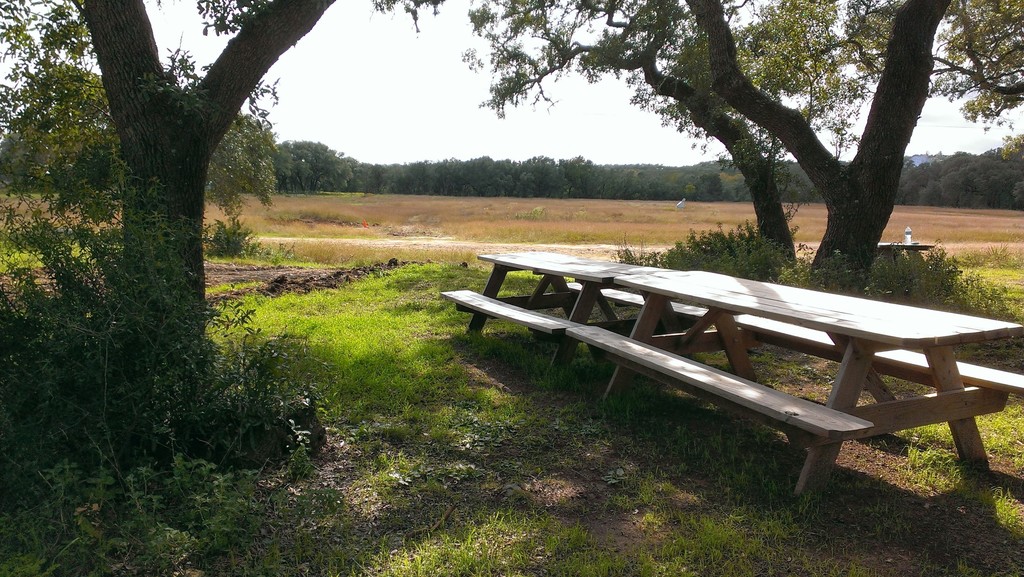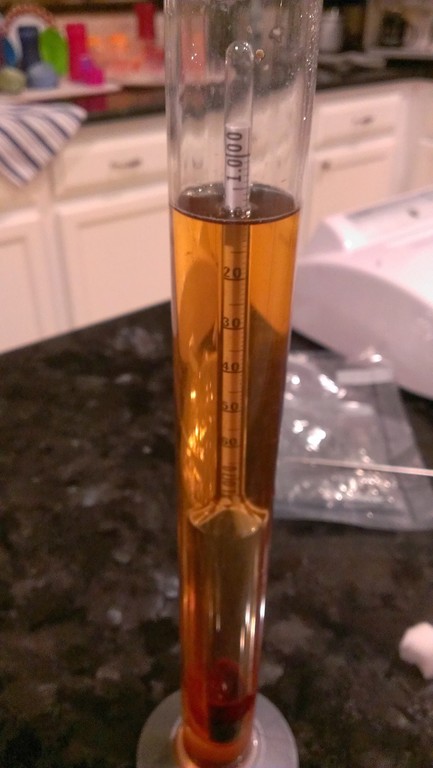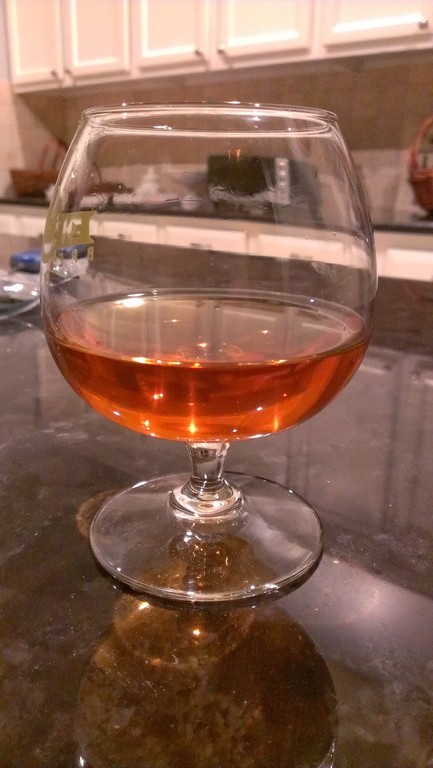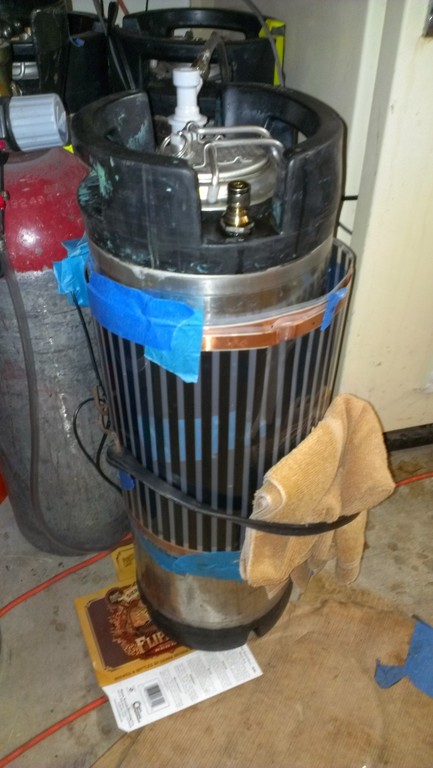
Sour mashing second runnings in a keg. A heat belt keeps the temp up for optimal souring
Last week I brewed 11G of my favorite RIS, Black Metal Stout. As I detailed in the last post, I sparged another 6 gallons of wort from the mash. I collected close to 6G of 1.030 wort. The initial pitch into the keg was a nylon bag with a couple of ounces of acidulated malt. I set the temperature controller for about 116 to handle the temp swings (up to 4 degrees worth) and keep the lacto from getting killed off at too high a temp.
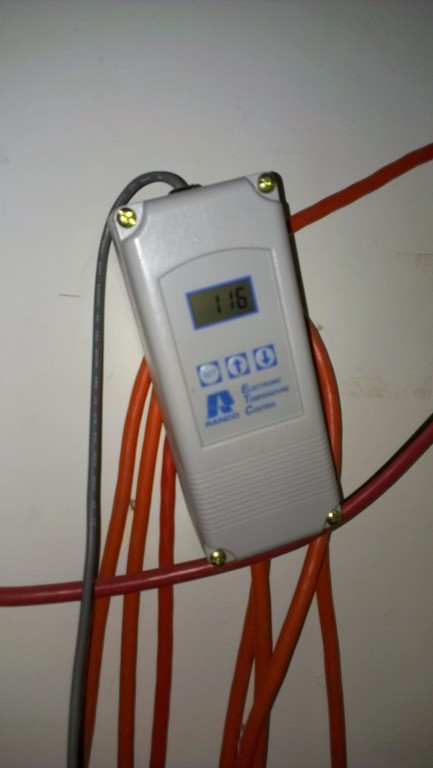
Temperature control is critical for sour mashing.
I decided to bolster the lacto forces by pitching a couple mL of lacto starter I’ve been stepping for a while. Initially this seemed enough. The first two days, pH was moving in the right direction, 3.8 followed by 3.7. Then oddly, on day 3, the pH was back up to 4.0.
On day 4, pH was up to 4.2 and I felt some additional bugs would be needed so I opened the nylon bag and added about 8oz of acidulated malt. This seemed to help. Day 5 AM reading was 3.83 down from a high of 4.2 and the taste was certainly moving toward a nice tartness. By Friday night, we hit a nice pH of 3.6 and a solid tart flavor.
The brew session was short. I first-wort hopped one of my favorite saison hops, Sorachi Ace. And then to complement the tart and dry flavors, and to pull some new hops (for me) out of the freezer, New Zeland Pacific Gem and Pacific Jade as finishing additions.
The post chill wort really tasted nice. The sour is there, but not too bold, and the herbal, earthy, but slightly citrus New Zealand hops work very well.
I oxygenated for 30 seconds and then pitched a very healthy dose of Brett B. Trois (Drie). I decided to ferment the beer in the same keg (sanitized of course) and I fashioned a simple blowoff mechanism via the Gas In port, Quick Disconnect and some tubing.
Here’s a recipe that simulates the beer but realize that this is a second runnings from a big RIS.
Recipe Details
| Batch Size |
Boil Time |
IBU |
SRM |
Est. OG |
Est. FG |
ABV |
| 5 gal |
30 min |
25.2 IBUs |
34.2 SRM |
1.033 |
1.007 |
3.4 % |
|
Actuals |
1.038 |
1.01 |
3.7 % |
Style Details
| Name |
Cat. |
OG Range |
FG Range |
IBU |
SRM |
Carb |
ABV |
| Saison |
16 C |
1.048 - 1.065 |
1.002 - 1.012 |
20 - 35 |
5 - 14 |
2.3 - 2.9 |
5 - 7 % |
Fermentables
| Name |
Amount |
% |
| Maris Otter (Thomas Fawcett) |
4 lbs |
69.57 |
| Chocolate Malt (Thomas Fawcett) |
1 lbs |
17.39 |
| Amber Dry Extract |
12 oz |
13.04 |
Hops
| Name |
Amount |
Time |
Use |
Form |
Alpha % |
| Sorachi Ace |
0.35 oz |
30 min |
First Wort |
Pellet |
12 |
| Pacific Gem - 2012 Crop - Purchased 20130220 |
0.71 oz |
5 min |
Boil |
Pellet |
14.6 |
| Pacific Jade - 2012 Crop - Purchased FHBS 20130220 |
0.71 oz |
5 min |
Boil |
Pellet |
13.1 |
Yeast
| Name |
Lab |
Attenuation |
Temperature |
| Brettanomyces Bruxellensis Trois (WLP654) |
White Labs |
70% |
65°F - 72°F |
Mash
| Step |
Temperature |
Time |
| Mash In |
150°F |
75 min |
Notes
Pitched grain bag with acid malt on it on Friday, 2013-11-15 @ 10PM.
Wrapped with heat belt and targeted 115 - 120F.
(2013-11-17)
at 48 hours, pH of 3.8 @ 23.1C
Very very light tartness, lots of grain in the nose. Husky. Chocolate, a bit of roast.
(2013-11-18)
at 60 hours, pH of 3.75 @ 22.7C
Same basic taste. Added a good dose of pure Lacto from stepped culture.
(2013-11-19)
It seems to be getting more lacto -- but it's hard to tell; clearly it's not massively sour yet. Oddly, the pH reading was 4.0 @ 23C -- it could be I need to calibrate the probe again. We'll give it another day.
(2013-11-20)
More mellow, I *think* a bit more sour, but nothing assertive. Ph is moving up... 4.2 @ 22C. Calibrated probe to 4.0. Pulled bag and added more acid malt. Need another day.
(2013-11-21)
Definitely getting more sour. Ph is back down, 3.83 @ 23C. Will check again tonight at 8PM (ph) and if we're in the 3.5 area, will boil and pitch yeast. If not, will wait till 11-22 evening.
(2013-11-22 AM)
Yay, more sour. Ph is at 3.71 @ 23C.
(2013-11-22 PM)
Yay, more sour. pH is at 3.61 @ 18.9C |




